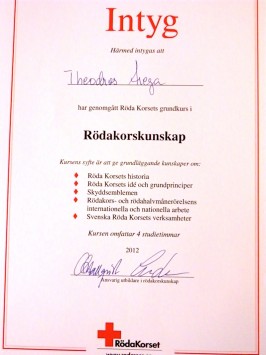
Hallelujah, I was finally able to attend a half-day course about the basic principles of the Red Cross Society last month here in Stockholm after spending endless hours for a couple of years searching for any volunteer organisations that are interested to take in refugees/asylum seekers in their (volunteer) programme.
One has no choice but to get accustomed to uncertainty. One loses self-esteem and starts to doubt one’s skills/talents after being forced to live a nightmarish life that neither the person him/herself nor his/her family imagined to be like in the “Promised Land”.
The most upsetting and saddest question is when people ask you “and … what are you doing in Sweden?” to which you have no convincing answer either to yourself or to the person who’s asking as to why you’re wasting your life.
The fact that you can’t be of use to yourself or to somebody else with all your skills, talents, knowledge and years of work experience either in your own “home” or “host” country is the worst thought you are to endure with every single day and night.
The feeling of not being useful and being found useful eats you up alive.
You become a bystander while others live and enjoy their lives to the fullest. Your hands are tied, your feet are shackled, your eyes are blindfolded, and your mouth is gagged. You simply cease to exist. Your daily routine is limited to eating & sleeping. You can’t help asking yourself what the hell you’re doing whenever you see people around you check their calendars to make sure they don’t waste each and every hour of their lives.
In some organisations, you can’t even make yourself useful by working as a volunteer unless you have a social security number (you’re lucky if you get a reply at all, especially from the Swedish churches). In which other part of the world does one have to wait months or in some cases years to serve the public for free? I volunteered, without any hassle, for an NGO that borrows skiing equipment at a kindergarten in a refugee camp while I was in Oslo, Norway.
As much as I’m homesick, I really hate calling back home because I have no answer to questions about what I’m doing and when I’m returning. Time flies by before I know it. Is the so-called “freedom” that I came looking for but rarely saw worth 7 years of my life?
I have interviewed personalities ranging from higher-ranking officials to ordinary citizens, athletes, artists, politicians. I have been to palaces, luxury hotels, ministries, parliaments and different touristic areas as a national TV journalist but all that has become a page in my history book and I highly doubt that I could ever do something close to it in the future considering my present hopeless circumstances.
The most tormenting experience about being an exiled professional in a country where your presence and potential/talents are neither welcomed nor acknowledged, is the uncertain future and your eventual guilty conscience.
Unlike many unskilled/semi-skilled asylum seekers/refugees, adapting to harsh realities of life in Europe is the worst, most traumatising ordeal to deal with if one was employed, had studied and had a well grounded life back home.It’s easier to hassle and fit into the life that is awaiting and is offered to you, if you’re from the former group. The feeling of being under-challenged makes you intellectually stunted, whereby boredom slowly wears you down to the point of contemplating to commit suicide.
Dear reader, by now I hope you’re asking yourself why would one ever trade his/her carrier, education, future, past, family, friends and everything he/she’s ever built throughout his/her life to live a destitute, purposeless, hopeless and meaningless life seeking “freedom” in a very far country where one is not even welcomed.
Isn’t it really ironic that Sweden has agreed recently to deport around 2000 asylum seekers in 2012? Who will go first? The estimated fifty to one hundred thousand invisible rejected asylum seekers who’ve been here for more than 10 years or the newly arrived ones?
Here’s my last two cents, I guess, there’s something wrong with the whole immigration system and its policies that would have to be overhauled if Sweden wants to make the best use of its under-utilised, skilled migrant professionals – legal or “illegal” – for mutual benefits. By the way, there’s no “ILLEGAL IMMIGRANT”, adieu.


